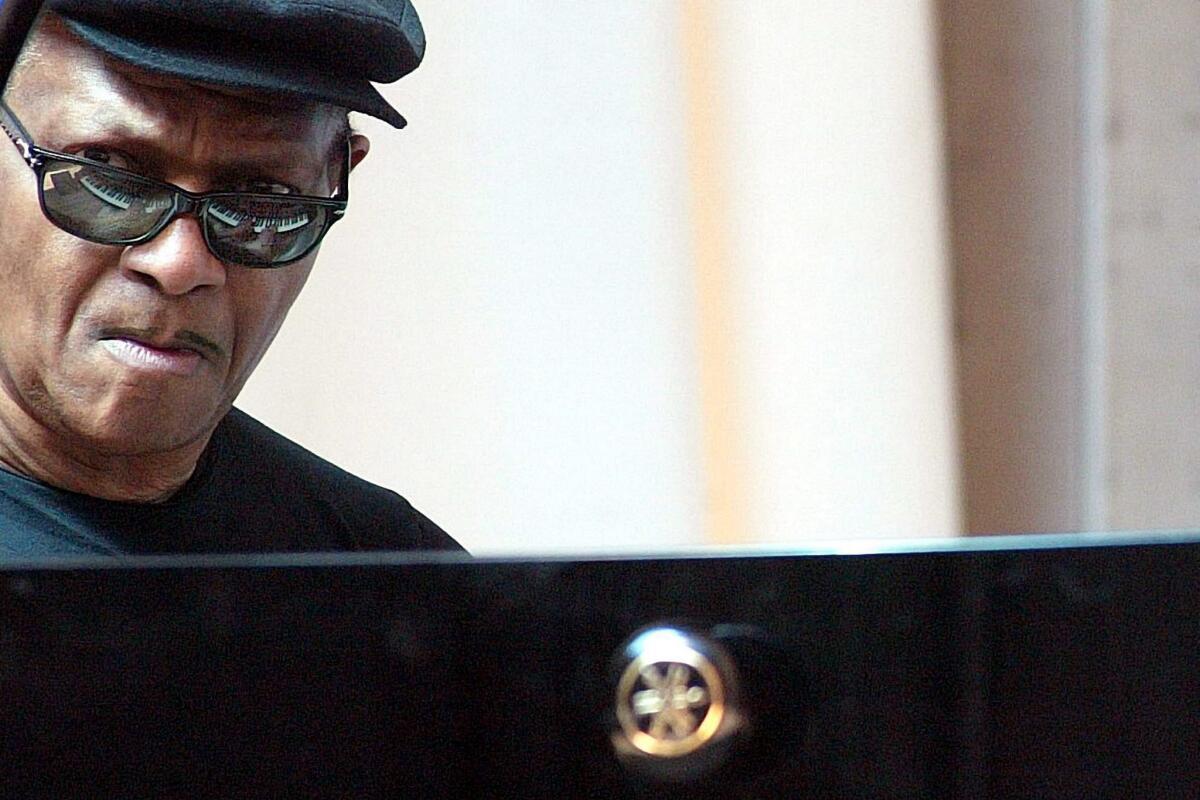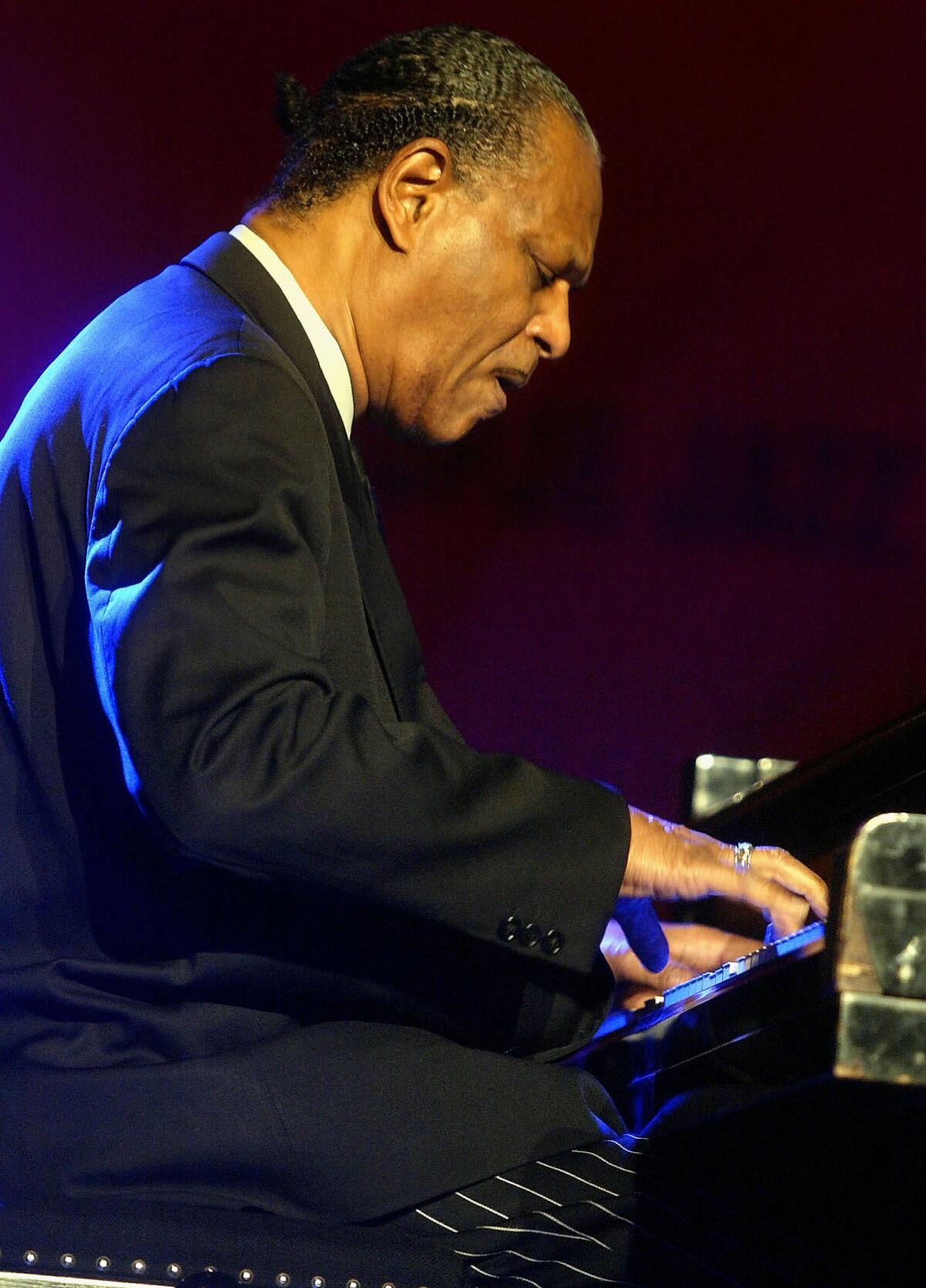McCoy Tyner, jazz piano legend who played with Coltrane, dead at 81

- Share via
McCoy Tyner, a pianist and composer viewed by musicians and critics alike as the most influential jazz pianist of the late 20th and early 21st centuries, has died. He was 81.
Tyner’s death was announced on his Facebook page and Twitter account Friday. It did not specify when or where he died or provide a cause of death.
Although he achieved his initial visibility as a member of the iconic John Coltrane Quartet of the early 1960s, Tyner continued, for the balance of his career, to be a probing, exploratory musical artist eager to widen the perspective of post-bebop and post-’60s avant-garde jazz.
“I’m not trying to repeat [the past], ’cause it’s done,” Tyner told The Times in 2013. “I always try to look ahead and see what’s next.”
The music that was produced by the John Coltrane Quartet during the five years when Tyner was a vital member had a far-reaching impact upon the jazz history of the following decades. Working closely with Coltrane, Tyner’s piano playing style identified him as an adventurous exponent of new ideas, as well as an impressive master of mainstream jazz.
In addition to the diversity of his jazz skills, he was also an early advocate of modal and scaled melodies, harmonies built on 4ths and 5ths, and percussive African rhythms.
Tyner never seemed bothered that so many players — young and old — adapted, even imitated, virtually every aspect of his playing style. Instead, he viewed it as a compliment.
“John used to tell me to keep things moving,” Tyner told the Philadelphia Inquirer in 1997. “He liked it when there was lots going on, when the music felt like it was churning underneath. Sound is intuitive: I didn’t start out trying to play certain things as much as react to what was happening. And what I did gave him the freedom he needed.”
It was a freedom that was essential to Coltrane’s imaginative improvising as well as Tyner’s own extraordinary solo excursions.
“Tyner not only threw up the sonic scaffolding that supported Coltrane’s saxophone ascents,” jazz critic Britt Robson in Variety in 2009, “but carried on with a near-equal density and thematic rigor when it was his turn to solo.”
The fact that Tyner was left-handed may have had some impact upon his unique approach to the piano, in which percussive bass figures (played by the left hand) are essential to the rich, almost orchestral, qualities of his harmonic textures.
In addition to piano, he was also fascinated by other instruments, some unlikely. On his 1972 album “Sahara,” he played the Japanese koto, a stringed instrument, as well as piano, flute and percussion. On “Trident” in 1975, he played harpsichord and celeste.
Although their closeness as friends and creative artists did not diminish, Tyner’s departure from the Coltrane band in 1965 is described in Lewis Porter’s Coltrane biography “John Coltrane: His Life and Music” as the result of some strong differences of opinion about the direction in which Coltrane, who died in 1967, was taking the quintet at the time.
“I didn’t see myself making any contribution to that music,” Tyner told Porter. “All I could hear was a lot of noise. I didn’t have any feeling for the music, and when I don’t have feelings, I don’t play.”
Despite his objections, Tyner’s post-Coltrane career combined new ideas of his own with numerous strong carryovers from his years with the Coltrane Quartet.
From the late ’60s well into the ’70s, Tyner recorded a series of highly regarded albums for the Blue Note and Milestone labels with a variety of different instrumentation. “Fly With the Wind,” released in 1976, featured the flute playing of Hubert Laws, the drumming of Billy Cobham and a string orchestra.
In the ’80s and ’90s, he worked frequently with a trio. More recently, recording for the Telarc label, he performed with bassist Charnett Moffett and drummer Al Foster. In 2008 he expanded into quartet format, with saxophonist Gary Bartz, bassist Gerald Cannon and drummer Eric Gravatt.
Alfred “McCoy” Tyner was born Dec. 11, 1938, in Philadelphia, the eldest of four children. Encouraged by his mother, who ran a beauty shop, he began taking piano lessons at 13, inspired by the fact that noted pianist Bud Powell and his younger brother Richie Powell, also a pianist, lived around the corner.
“My mother gave me a choice,” Tyner recalled. “She said ‘Would you like to take singing lessons or piano?’ I’m glad I chose piano.”
Drawn to classical music as well as jazz, he also studied African drumming from a Ghanaian musician, an experience which may have influenced the growth of his percussively rhythmic style.
Tyner led his own group — the rhythm and blues-styled Houserockers — while he was in his mid-teens, becoming increasingly active in a city that was also home to the likes of pianists Red Garland and Kenny Barron, saxophonists Benny Golson and Joe Henderson, drummer Philly Joe Jones and trumpeters Lee Morgan and Clifford Brown.
In his late teens, he joined the Jazztet, led by Golson and trumpeter Art Farmer, as the legendary group’s first pianist. The uniquely expressive qualities of his powerful rhythm section playing were vital elements in the Jazztet’s numerous successes.
At 17, Tyner converted to Islam via the Ahmadiyya Muslim Community — the home also of Yusef Lateef, Ahmad Jamal, Art Blakey and other jazz musicians — taking the name Sulieman Saud.
He first met Coltrane in 1957, when the saxophonist lived nearby and was playing with Miles Davis.
“I used to go to John’s house and sit on the porch and talk about music — about a lot of things that he eventually began to get into,” Tyner told Down Beat magazine. “So I think theoretically I was sort of involved in his way of thinking quite early ... we coincided.”

After they did a concert together, Coltrane asked Tyner to join him in a new band he was organizing. They remained together from 1960 to 1965. That Coltrane band, with Tyner playing piano, Coltrane playing tenor and soprano saxophones, Jimmy Garrison playing bass and Elvin Jones playing drums, became — along with the Miles Davis groups of the late ’50s and ’60s — one of the definitive jazz ensembles of the 20th century.
The National Endowment for the Arts awarded Tyner a Jazz Masters Award in 2003.
Heckman is a former Times jazz critic.
More to Read
Start your day right
Sign up for Essential California for the L.A. Times biggest news, features and recommendations in your inbox six days a week.
You may occasionally receive promotional content from the Los Angeles Times.







